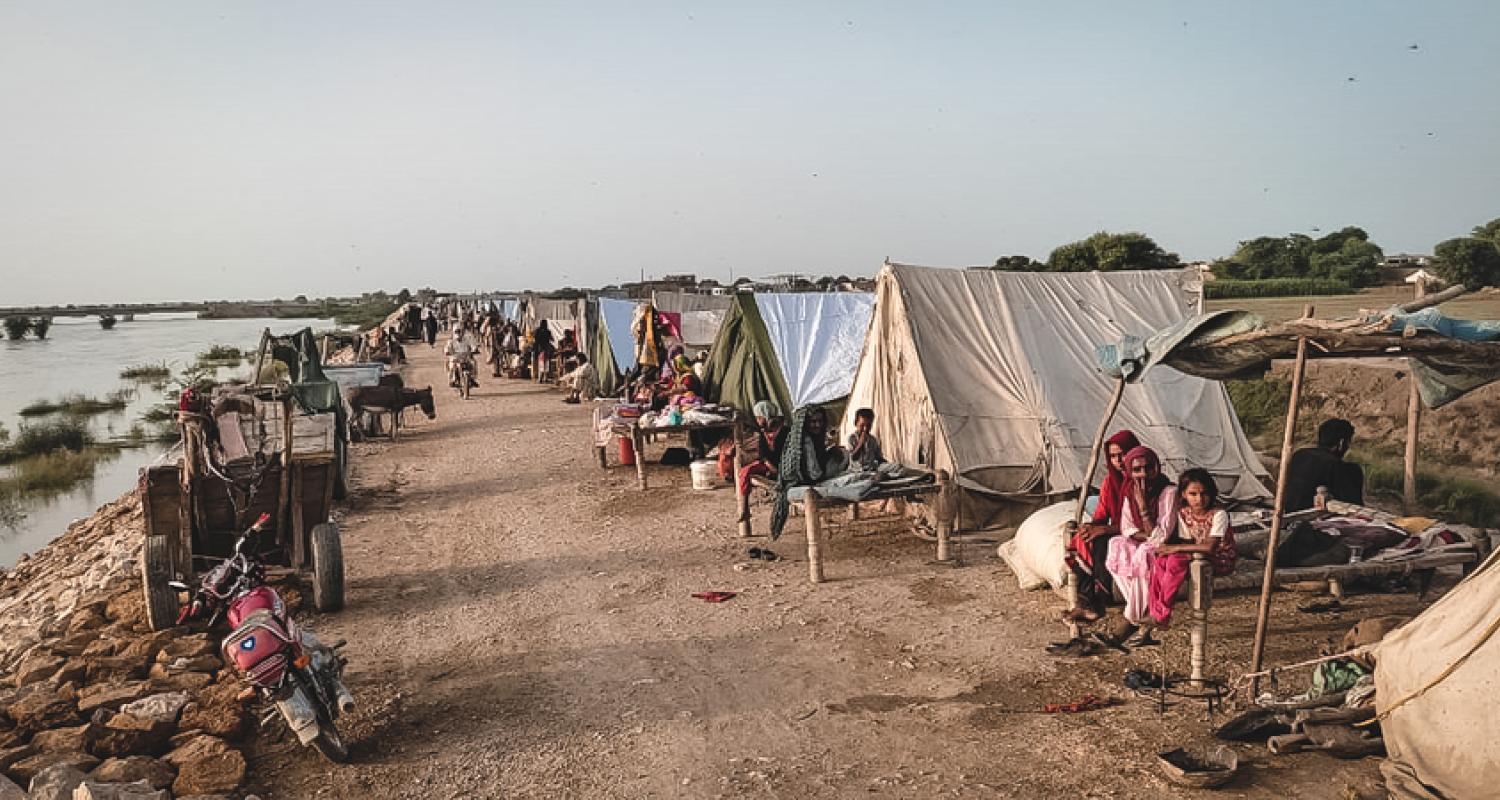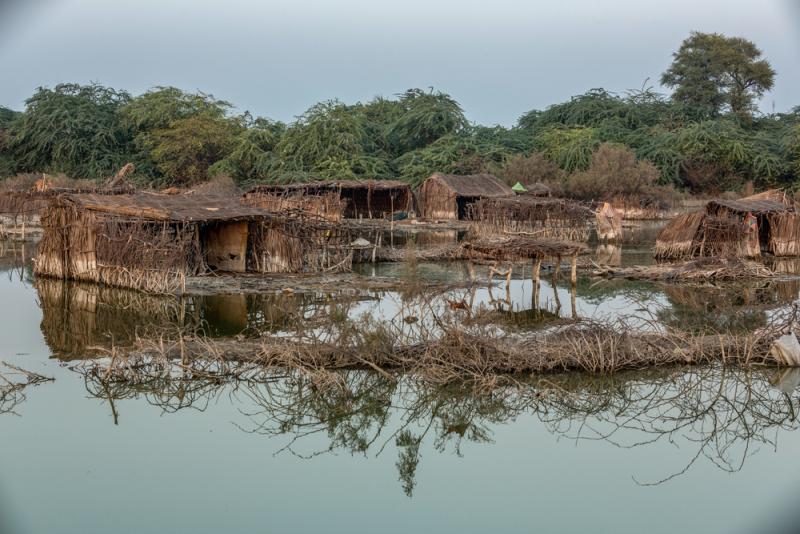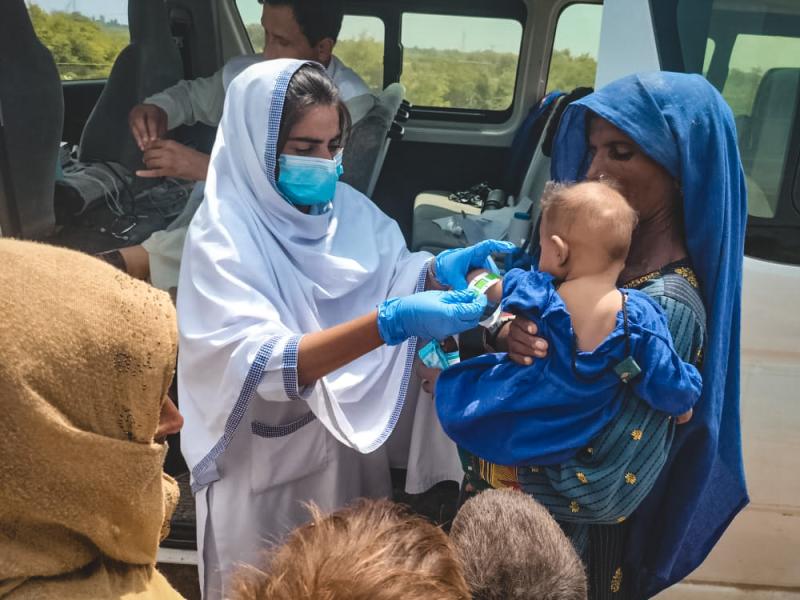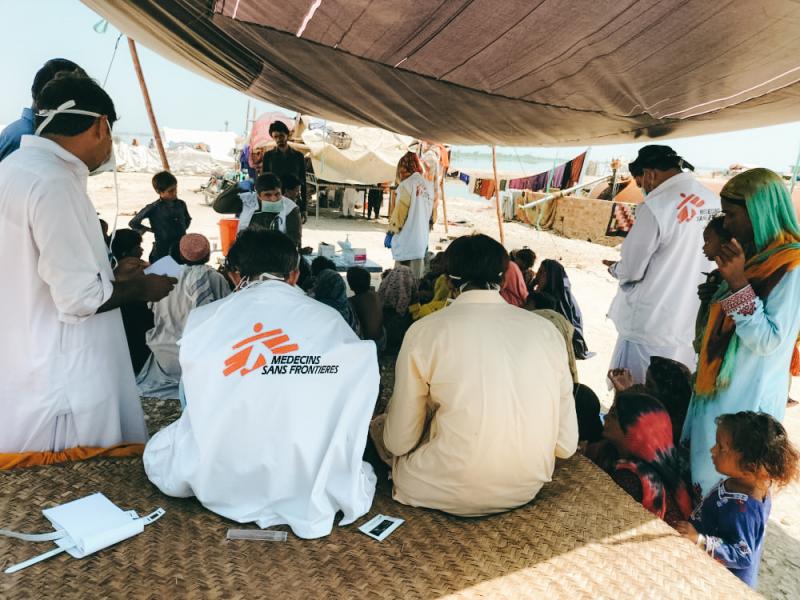It has been more than three months since floods in Pakistan caused vast damage across the country, with a lasting impact on affected communities. People had to leave their villages and spend months living in camps with or without shelter and access to basic needs. Now that the water has receded in some areas and people are returning to their villages, they are finding their houses and land damaged and infrastructure destroyed. Others are unable or unwilling to return and are exposed to water and vector-borne diseases and worsening winter conditions. The need for healthcare and clean drinking water for those affected by the floods remains very high.
Will you support our crisis response?
You can help our work in Pakistan and around the world by making a donation today.
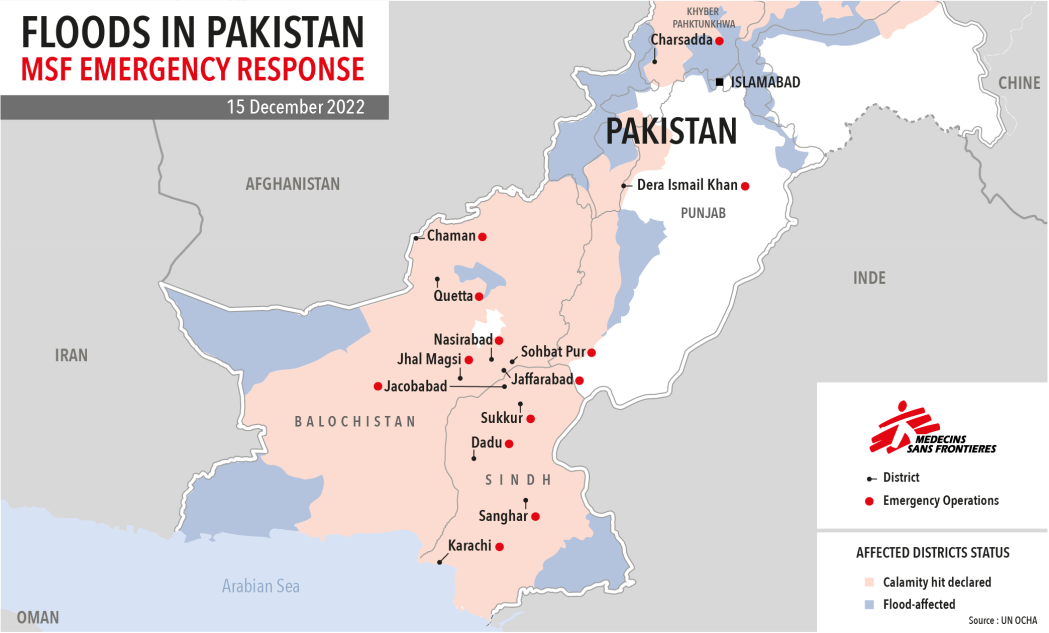
(Updated on 10 January 2023)
Doctors Without Borders Response
-
Over 95,900 mobile clinic patient consultations in Sindh, Balochistan and Khyber Pakhtunkhuwa.
-
Over 44,800 kits of essential relief items, including hygiene and kitchen kits, mosquito nets and mosquito repellent, distributed to affected families in Balochistan, Khyber Pakhtunkhuwa and Sindh.
-
Over 465,494m3 litres of clean drinking water provided in Sindh, Balochistan and Khyber Pakhtunkhwa.
-
Over 23,707 patients treated for malaria and 7,458 treated for malnutrition at our mobile clinics in Eastern Balochistan and Sindh.
- Response in Sindh
In Sindh, the floodwaters have receded in some places but are still present in many areas. Doctors Without Borders emergency teams are running six mobile clinics that visit over 24 different locations per week in the Dadu, Jacobabad, Sukkur and Shahadat Kot districts of Sindh. So far they have provided basic medical care to over 33,780 people, mainly for skin diseases, malaria, respiratory tract infections and diarrhoea.
In North Sindh and Johi town, our teams are seeing high numbers of cases of malaria. In the past two months, our teams have treated more than 12,100 people for malaria. Our teams are continuing to provide clean drinking water, with 4,148m3 litres already distributed. Our teams have also helped to distribute 562 hygiene kits to residents of remote flood-affected areas.
In North Sindh our teams are seeing high numbers of children with malnutrition at our mobile clinics. They have screened 9,246 children under five for malnutrition. Of those, 2,535 had severe acute malnutrition and 2,243 had moderate acute malnutrition.
In South Sindh, our teams in Dadu district are providing medical care through three mobile clinics visiting over 11 locations. Our water and sanitation teams have also provided over 444,460m3 litres of clean drinking water and have distributed around 24,600 relief packages to affected communities. In Sanghar district, our team have provided 5,120m3 litres of clean drinking water in the three worst-affected tehsils and have distributed 6,000 relief packages including tents, kitchen kits, hygiene kits and mosquito nets. The teams are also providing antenatal and postnatal healthcare in the district.
In Keamari Karachi district, Doctors Without Borders teams are working in Karachi tent city camp where they have set up more than 800 shelters, are providing more than 10,000 litres of clean drinking water every day, have installed 141 shower points and latrines, and have distributed 1,350 relief packages, including 600 mosquito nets, in collaboration with health authorities.
- Response in Balochistan
In Eastern Balochistan, the floodwaters have receded in many areas but the worst-affected districts of Sohbatpur and Jaffarabad are still largely under water, while pools of stagnant water are spread across other areas. Families living near flooded areas are vulnerable to water- and vector-borne diseases.
In Eastern Balochistan, Doctors Without Borders has five medical teams in Naseerabad, Sohbatpur, Jaffarabad, Usta Muhammad and Jhal Magsi districts. Our teams are providing outpatient primary healthcare to people affected by the floods, treating more than 1,000 patients daily. Areas of stagnant water are a major contributor to the rise in the number of people with water- and vector-borne diseases in Eastern Balochistan. Our teams are treating high numbers of people with malaria, severely malnourished children, and people with respiratory tract infections, diarrhoea and skin diseases, including ear infections. Doctors Without Borders has provided more than 10 million litres of clean drinking water in five districts of Eastern Balochistan.
In the past two months, Doctors Without Borders emergency teams have treated 11,533 cases of malaria with a positivity ratio of over 50 per cent. These numbers are concerningly high compared to previous years. We are also seeing high numbers of patients with malnutrition and have treated 3,965 children and pregnant and lactating women.
In October, Doctors Without Borders' water and sanitation teams installed a water filtration plant with a capacity of 270,000 litres per day in Jaffarabad district. The clean drinking water is delivered through water trucking to flood-affected villages and displaced person camps in Eastern Balochistan, which helps mitigate the risk of waterborne disease caused by contaminated water. The team has provided a total of 13,050,000 litres of clean drinking water in five districts of Eastern Balochistan.
Since 2008, Doctors Without Borders has worked in DHQ hospital in Dera Murad Jamali in support of the Department of Health (DoH). In recent months, Doctors Without Borders has bolstered this support, deploying additional medical and non-medical experts and increasing bed capacity from 40 to 69. Since September, our team has assisted 1,382 deliveries and admitted 1,142 children to the paediatric inpatient department.
In Western Balochistan, Doctors Without Borders has provided over 735 medical consultations in Chaman, and over 1,890 outpatient consultations in Quetta, mostly for patients with respiratory infections or acute watery diarrhoea. In Quetta, Doctors Without Borders water and sanitation teams have provided more than 2,190 litres of clean drinking water. A total of 740 relief kits including hygiene items, kitchen tools and mosquito nets have also been distributed to affected families.
- Response in Khyber Pakhtunkhwa
In Charsadda and Nowshera districts, the floodwaters have receded and families have returned to their homes or are rebuilding their damaged houses. However, water sources in the flood-hit districts, including Charsadda and Nowshera, remain contaminated and are contributing to waterborne diseases in the area. To tackle this issue, Doctors Without Borders water and sanitation teams have been cleaning and repairing water sources since October.
In Charsadda and Nowshera districts, four Doctors Without Borders mobile medical teams have provided 9,000 outpatient primary healthcare consultations for respiratory tract infections, eye infections, acute diarrhoea, severe skin infections and chronic diseases. Doctors Without Borders has also donated medical items to the hospital in Nowshera to support the isolation unit for patients with dengue fever. Doctors Without Borders emergency water and sanitation teams have installed water filtration systems, have provided 34m3 litres of clean drinking water and have cleaned and decontaminated 500 wells in flood-affected villages in Charsadda district. The aim is to clean 1,500 wells by the end of March 2023. In both districts Doctors Without Borders teams have distributed a total of 11,386 relief packages, including kitchen sets, hygiene items and 14,107 mosquito nets to affected families.
Doctors Without Borders teams in various villages in Dera Ismail Khan district are distributing around 5,000 winter kits to flood-affected communities.
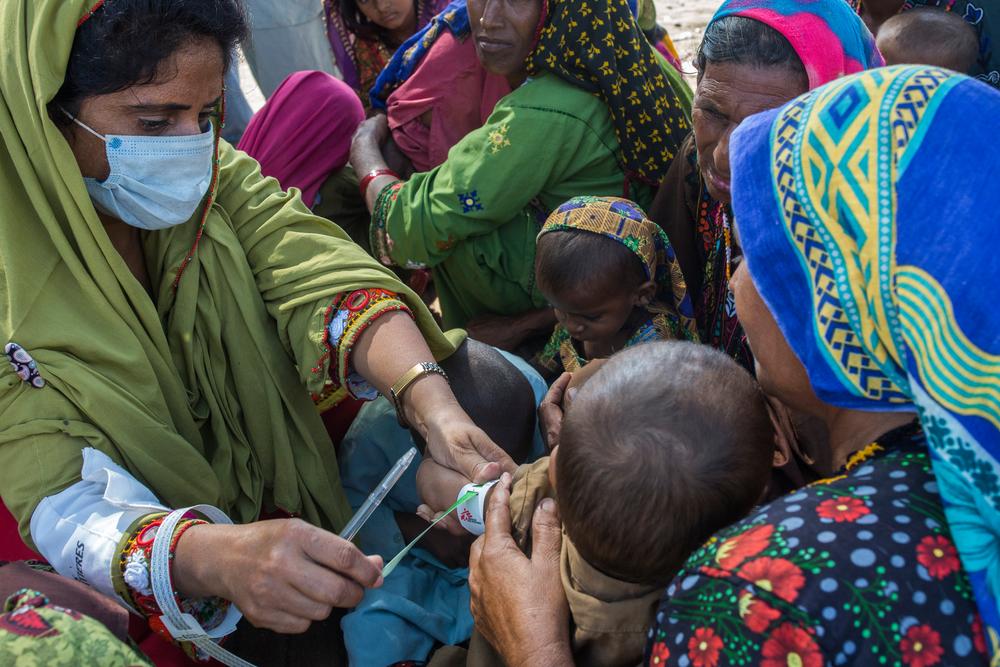
A Doctors Without Borders' staff examines temperature and child malnutrition during a mobile clinic setup in the Sindh Province. Pakistan, October 2022. © Asim Hafeez
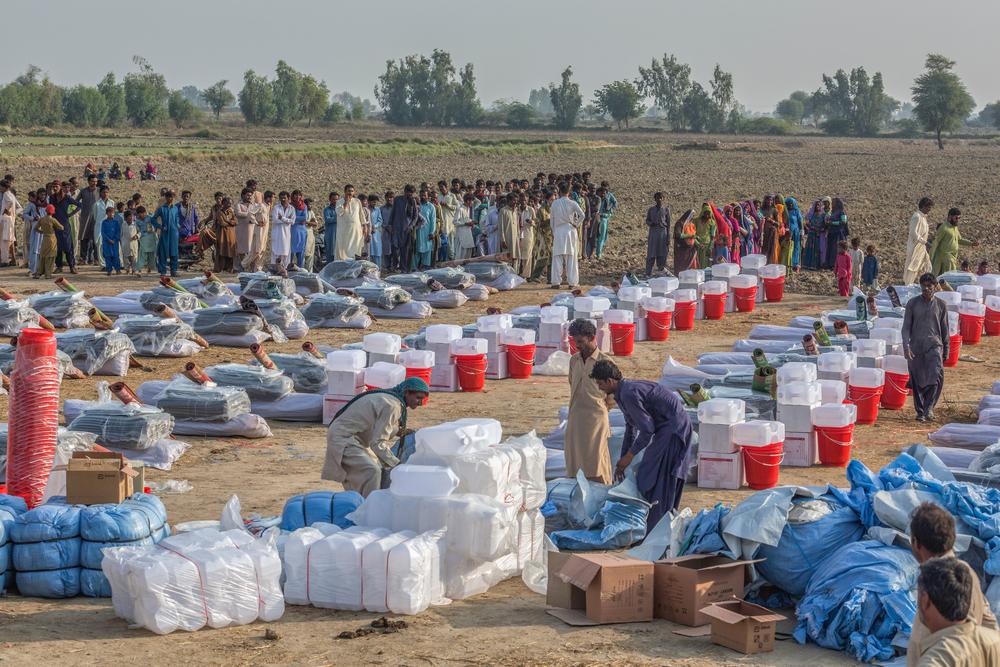
Doctors Without Borders' staff and volunteers arranges Non Food Items (NFIs) kits for distribution, as peoples affected by flood and rainwater waits to receive NFIs at a village near Sanghar, Sindh Province. Pakistan, November 2022. © Asim Hafeez for MSF
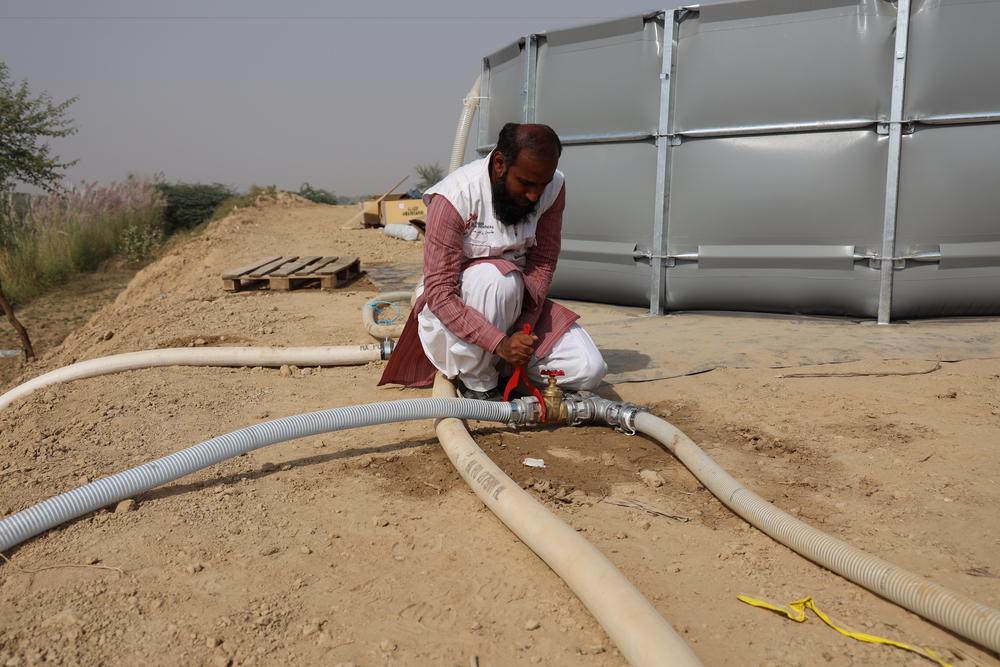
A Doctors Without Borders' Water and Sanitation Specialist is checking the water pipe fixings of the water filtration plant installed by Doctors Without Borders in district Jaffarabad, Eastern Balochistan. Pakistan, October 2022. © Zahra Shoukat/MSF
Doctors Without Borders began working in Pakistan in 1986, and now has 1,738 national staff and 53 international staff working in seven regular projects. In 2022, over 50 international staff were additionally sent to support the flood response. Doctors Without Borders has been committed to supporting affected communities in Pakistan and has responded to natural disasters over the years. Hundreds of Pakistani staff, including medical and non-medical specialists have been at the core of this response to emergencies, making it possible to reach those in need. Doctors Without Borders launched a large-scale response to the 2005 earthquake, the floods of 2010 and 2016, the measles and dengue outbreaks in 2010 and 2013, and COVID-19 in 2020 to 2021. We also responded to the flooding in Dadu in Sindh in 2020.
Support our medical response
You can help our work in Pakistan and around the world by making a donation today.
